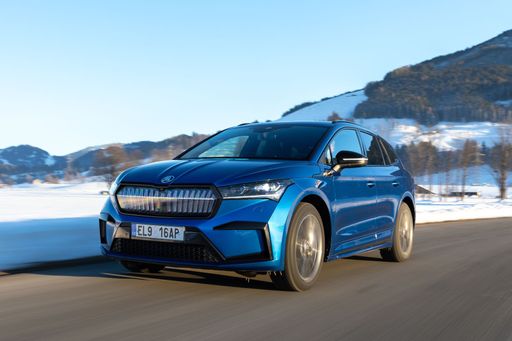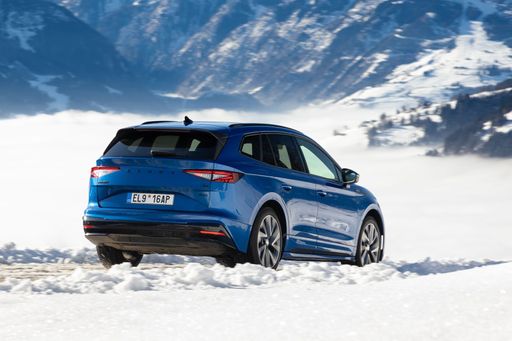Skoda Enyaq vs Kia PV5 – Which model is better for everyday use?
Compare performance, boot capacity, efficiency and price at a glance.
Find out which car is the better choice for you – Skoda Enyaq or Kia PV5?
Costs and Efficiency:
Price and efficiency are key factors when choosing a car – and this is often where the real differences emerge.
Kia PV5 has a to a small extent advantage in terms of price – it starts at 32800 £, while the Skoda Enyaq costs 38100 £. That’s a price difference of around 5237 £.
In terms of energy consumption, the advantage goes to the Skoda Enyaq: with 14.80 kWh per 100 km, it’s clearly perceptible more efficient than the Kia PV5 with 19.80 kWh. That’s a difference of about 5 kWh.
As for range, the Skoda Enyaq performs noticeable better – achieving up to 587 km, about 187 km more than the Kia PV5.
Engine and Performance:
Power, torque and acceleration are the classic benchmarks for car enthusiasts – and here, some clear differences start to show.
When it comes to engine power, the Skoda Enyaq has a convincingly edge – offering 340 HP compared to 163 HP. That’s roughly 177 HP more horsepower.
In acceleration from 0 to 100 km/h, the Skoda Enyaq is decisively quicker – completing the sprint in 5.40 s, while the Kia PV5 takes 10.70 s. That’s about 5.30 s faster.
In terms of top speed, the Skoda Enyaq performs noticeable better – reaching 180 km/h, while the Kia PV5 tops out at 135 km/h. The difference is around 45 km/h.
There’s also a difference in torque: Skoda Enyaq pulls decisively stronger with 679 Nm compared to 250 Nm. That’s about 429 Nm difference.
Space and Everyday Use:
Cabin size, boot volume and payload all play a role in everyday practicality. Here, comfort and flexibility make the difference.
Both vehicles offer seating for 5 people.
In curb weight, Kia PV5 is hardly perceptible lighter – 1860 kg compared to 2002 kg. The difference is around 142 kg.
In terms of boot space, the Kia PV5 offers clearly more room – 1320 L compared to 585 L. That’s a difference of about 735 L.
In maximum load capacity, the Kia PV5 performs convincingly better – up to 4420 L, which is about 2710 L more than the Skoda Enyaq.
When it comes to payload, Kia PV5 noticeable takes the win – 790 kg compared to 509 kg. That’s a difference of about 281 kg.
Who wins the race?
The Skoda Enyaq proves to be dominates this comparison and therefore becomes our DriveDuel Champion!
Skoda Enyaq is the better all-rounder in this comparison.
 @ Škoda Auto a.s. / Škoda Storyboard
@ Škoda Auto a.s. / Škoda Storyboard
Skoda Enyaq
Skoda Enyaq
The Skoda Enyaq is a cleverly packaged electric SUV that blends roomy, pragmatic family space with clean, Czech design and sensible value. On the road it’s unshowy but composed, offering serene electric performance and easy-to-use tech — the kind of car that makes daily life smoother without trying too hard.
details @ Škoda Auto a.s. / Škoda Storyboard
@ Škoda Auto a.s. / Škoda Storyboard
 @ Škoda Auto a.s. / Škoda Storyboard
@ Škoda Auto a.s. / Škoda Storyboard
 @ Škoda Auto a.s. / Škoda Storyboard
@ Škoda Auto a.s. / Škoda Storyboard
 @ Škoda Auto a.s. / Škoda Storyboard
@ Škoda Auto a.s. / Škoda Storyboard
 @ Škoda Auto a.s. / Škoda Storyboard
@ Škoda Auto a.s. / Škoda Storyboard
Kia PV5
The Kia EV5 is an exciting new entrant in the landscape of electric SUVs, promising a blend of style and innovation that captures attention. It boasts a sleek and modern design that aligns with Kia's evolving aesthetic identity, blending practicality with eye-catching details. With its foray into the electric vehicle segment, the EV5 is set to offer a highly competitive option for those looking to embrace sustainable mobility without compromising on comfort or tech features.
details
 @ Škoda Auto a.s. / Škoda Storyboard
@ Škoda Auto a.s. / Škoda Storyboard
|
|
|
|
|
Costs and Consumption |
|
|---|---|
|
Price
38100 - 52200 £
|
Price
32800 - 38900 £
|
|
Consumption L/100km
-
|
Consumption L/100km
-
|
|
Consumption kWh/100km
14.8 - 16.2 kWh
|
Consumption kWh/100km
19.8 - 20.3 kWh
|
|
Electric Range
428 - 587 km
|
Electric Range
288 - 400 km
|
|
Battery Capacity
59 - 79 kWh
|
Battery Capacity
51.5 - 71.2 kWh
|
|
co2
0 g/km
|
co2
0 g/km
|
|
Fuel tank capacity
-
|
Fuel tank capacity
-
|
Dimensions and Body |
|
|---|---|
|
Body Type
SUV
|
Body Type
Cargo Van, Bus
|
|
Seats
5
|
Seats
2 - 5
|
|
Doors
5
|
Doors
4 - 5
|
|
Curb weight
2002 - 2293 kg
|
Curb weight
1860 - 2145 kg
|
|
Trunk capacity
570 - 585 L
|
Trunk capacity
1320 L
|
|
Length
4658 - 4660 mm
|
Length
4695 mm
|
|
Width
1879 mm
|
Width
1850 - 1895 mm
|
|
Height
1605 - 1625 mm
|
Height
1923 mm
|
|
Max trunk capacity
1610 - 1710 L
|
Max trunk capacity
2300 - 4420 L
|
|
Payload
457 - 509 kg
|
Payload
505 - 790 kg
|
Engine and Performance |
|
|---|---|
|
Engine Type
Electric
|
Engine Type
Electric
|
|
Transmission
Automatic
|
Transmission
Automatic
|
|
Transmission Detail
Reduction Gearbox
|
Transmission Detail
Reduction Gearbox
|
|
Drive Type
Rear-Wheel Drive, All-Wheel Drive
|
Drive Type
Front-Wheel Drive
|
|
Power HP
204 - 340 HP
|
Power HP
121 - 163 HP
|
|
Acceleration 0-100km/h
5.4 - 8.1 s
|
Acceleration 0-100km/h
10.7 - 16.3 s
|
|
Max Speed
160 - 180 km/h
|
Max Speed
135 km/h
|
|
Torque
310 - 679 Nm
|
Torque
250 Nm
|
|
Number of Cylinders
-
|
Number of Cylinders
-
|
|
Power kW
150 - 250 kW
|
Power kW
89 - 120 kW
|
|
Engine capacity
-
|
Engine capacity
-
|
General |
|
|---|---|
|
Model Year
2025
|
Model Year
2025
|
|
CO2 Efficiency Class
A
|
CO2 Efficiency Class
A
|
|
Brand
Skoda
|
Brand
Kia
|
Is the Skoda Enyaq offered with different drivetrains?
The Skoda Enyaq is available as Rear-Wheel Drive or All-Wheel Drive.
The prices and data displayed are estimates based on German list prices and may vary by country. This information is not legally binding.
